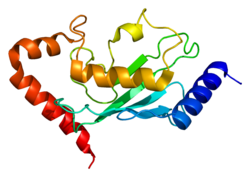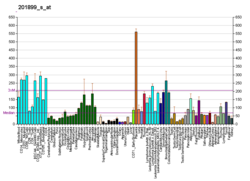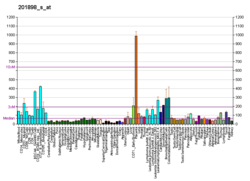Ubiquitin-conjugating enzyme E2 A is a protein that in humans is encoded by the UBE2A gene. [5] [6]
Contents
The modification of proteins with ubiquitin is an important cellular mechanism for targeting abnormal or short-lived proteins for degradation. Ubiquitination involves at least three classes of enzymes: ubiquitin-activating enzymes, or E1S, ubiquitin-conjugating enzymes, or E2S, and ubiquitin-protein ligases, or E3S. This gene encodes a member of the E2 ubiquitin-conjugating enzyme family. This enzyme is required for post-replicative DNA damage repair. Multiple alternatively spliced transcript variants have been found for this gene, and they encode distinct isoforms. [6]









